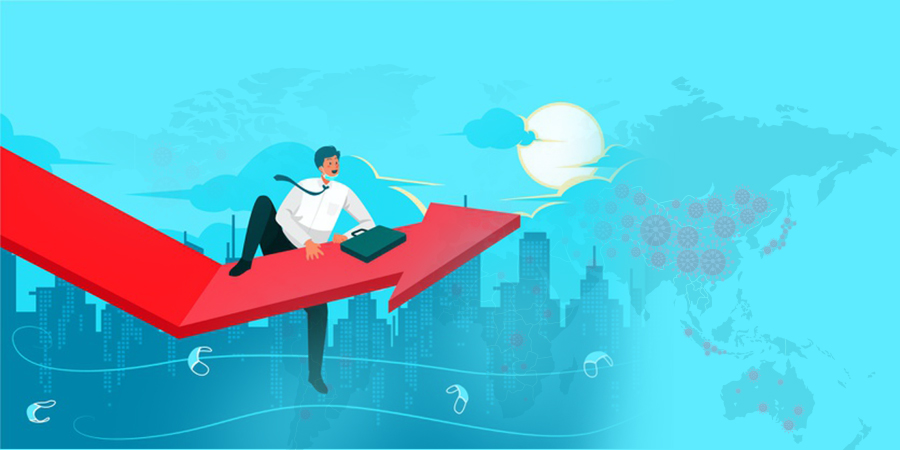
- Roadmap
- 19-Nov-2020 10:19:59
Is your business ready for the New Normal?
The world is getting accustomed to disasters. It has become habituated to nurturing its traits regardless of obstacles and consequences. Such adaptive progression amidst all the present-day odds is called the new normal. The subject in question here is, how are businesses going to take-on the new normal and continue doing what they always do?
The new normal has changed the very basics of business-routine as all the usual means for procuring, processing, and distributing goods/services are blocked. So, the organizations are learning how to adapt to the dictates of the pandemic by finding new ways to network with their national/international suppliers/clients. In this venture, the immediate concern of the organizations is to seek flexible and transparent ERP systems that would support their strategies.
While choosing ERP systems in the new normal, the top priority must be to ascertain the flexibility and technical prowess of the system to scale the consequences of any supply chain disruption. In this context, it would be appropriate to briefly understand the five most common reasons for supply chain disruption along with its possible impacts on the market and business environment. Supply chain disruptions mostly occur due to Natural Disaster, Pandemic, Transportation delays, Cybertheft/attack, and Product-oriented issues [1].
Natural disasters like earthquakes, floods, tsunamis, landslides, hurricanes, etc., cannot be predicted and can utterly destroy supply chains. The impact of such disruptions could resonate on a global scale despite the insignificance of the epicenter. On the contrary, pandemics affect the supply chain by the vastness of its devastation in terms of cramping herds of people, governments, institutions, companies, logistics, and whatnot. It is evident from the COVID-19 scenario that the world is experiencing right now.
For a flourishing business, nothing could be more disappointing than a collapse in the transport system. Many factors like natural disasters, accidents, transport strikes, breakdowns, and pandemics could cause transportation failure. Any such disruption involved in the procurement of raw materials will stipulate significant alterations to the production timeline by drastically extending the lead times and hence production costs. Similarly, even a minor delay in dispatching a consignment to the clients might amplify it to the tune of months and years at the destination.
Cyber attacks are "launched from one or more computers against another computer, multiple computers or networks" [2]. These attacks aim to disable the target system and gain access to its data for acquiring admin privileges. By doing so, the perpetrators could manipulate the targeted business and adversely affect it even to the tune of nullifying its stock price in the market. Experts infer that cyber attacks "can cause massive damage to government systems, hospital records, and national security programs, which might leave a country, community or organization in turmoil and in fear of further attacks" [3].
The primary functions of the supply chain network are procurement of materials, processing of these materials into Semi-Finished Goods (SFG), and/or Finished Goods (FG), and the physical distribution of the SFGs/FGs to customers. In this most elementary cycle, if anything goes wrong with the crucial aspect of producing the SFG or FG, the very purpose of a company shall cease to exist. A business that cannot even live up to its commitment to deliver a proposed commodity loses the necessity for its existence.
Experts are providing solutions and proposing suggestions for countering the difficulties that are caused by these disrupting circumstances and factors. Many such ploys are the time-tested methods with a high success rate during similar disruptions in the past. But, these ideas have proved to be ineffective in handling the ongoing unprecedented COVID-19 situation. While realizing this bitter fact, the world is also witnessing the unhampered progress of the businesses that are powered by the e-commerce enabled digital grit of ERP solutions.
Upon a rapid yet careful assessment of the prevailing scenario, industry experts have confirmed that all companies must deploy a suitable ERP system to even exist in the new normal. Thus, the primary, as well as the ultimate need of the hour for all business entities, happen to be a digitally empowered ERP solution that is infused with contemporary technologies and built on a robust digital platform.
The digital-ingenuity of Roadmap ERP is evident from the unhampered business progress of its clients despite the uncertainties unleashed by the pandemic. The e-commerce enabled Roadmap ERP is compatible with all industry types and has taken risk management to an entirely new level by granting:
- Absolute transparency on real-time business and market scenario,
- Digital agility to quickly assess any business situation, and
- Anytime anywhere business access to overcome interruptive disruptions.
References:
1. https://www.bigcommerce.com/blog/supply-chain-disruptions/#5-types-of-supply-chain-disruptions
3. https://en.wikipedia.org/wiki/Cyberterrorism




